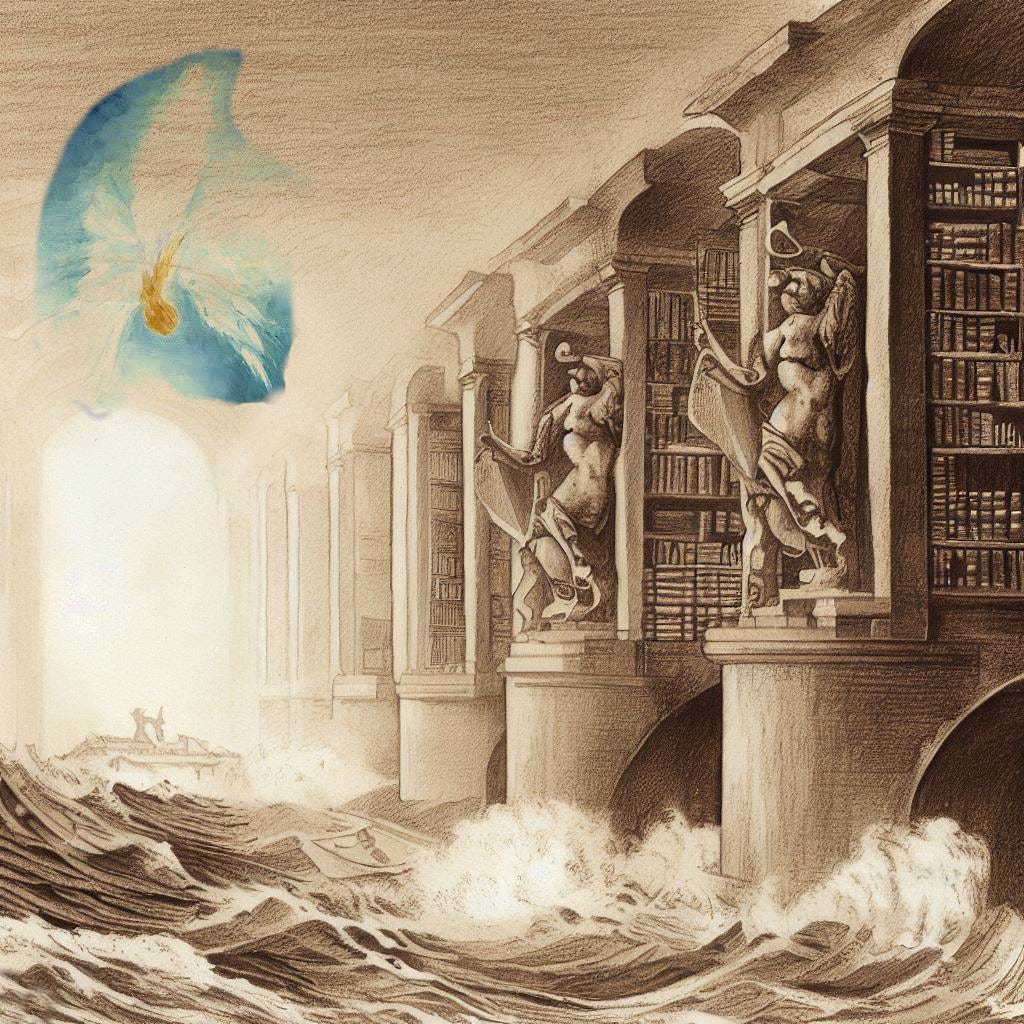So I return decades later to the same room.
Epidemics, heretical conflicts, peregrinations which inevitably degenerate into banditry, have decimated the population. I believe I have mentioned suicides, more and more frequent with the years. Perhaps my old age and fearfulness deceive me, but I suspect that the human species -- the unique species -- is about to be extinguished, but the Library will endure: illuminated, solitary, infinite, perfectly motionless, equipped with precious volumes, useless, incorruptible, secret.
I have just written the word “infinite”.' I have not interpolated this adjective out of rhetorical habit; I say that it is not illogical to think that the world is infinite. Those who judge it to be limited postulate that in remote places the corridors and stairways and hexagons can conceivably come to an end -- which is absurd. Those who imagine it to be without limit forget that the possible number of books does have such a limit. I venture to suggest this solution to the ancient problem: The Library is unlimited and cyclical. If an eternal traveler were to cross it in any direction, after centuries he would see that the same volumes were repeated in the same disorder (which, thus repeated, would be an order: the Order). My solitude is gladdened by this elegant hope.
In the last paragraphs of this famous work, we have examples of the urge to throw stuff into the gap, and these show, if not the know-how, that this activity, this doing… —is a worlding urge, to do something anything, not necessarily in order, not necessarily in anxiety, but in living.
but the Library will endure
Even if all the individuals each die, even if they all die, even if they collectively disappear, the world goes on. This is a core hope of worlding, this is a core world of hope, and so to world-build in fear that that hope is lost, is bad worlding, and so bad world-building.
The cyclic nature of a cosmos is the symbol of hope. We are urged to this eternal spring. We are springed to urge. Is it true? We gap over the question.
The world will go on without us, because life goes on. Without each of us there is no world, but the world goes on regardless. The urge, the spring does not care, as long as we self the world. Even if we world badly, that is our job. To world well is something we world into existence as we self. We care, the world does not.
The world goes on. Infinite like hope.

Worlding is to worldbuilding what a hug is to a fine suit of clothes, what a campfire is to a palace.
Now the individuals are important here because they are the ones worlding. The world does not world, nor does some god or pharaoh world for us. We each do that creative work, worlding as we self along. It is the individuals who live and so self as they world together. Calling the world, calling this a “creation” is an error of reification, a sleight of mind. A short cut through dangerous territory. (The map is not the territory, even when we hope land into country.)
In turn this bad worlding provides a pathway of practical power and so allows powerful worldbuilders to empire-build, and excuse themselves in doing this in the name of some salvation, of some entitled honour that they privatise to the person as monarch, often by restricting worlding powers or potentials to their martial gods who just so happen to be their ancestors. (The concept of sovereignty is an outcome of this process among squabbling kings.)
Worlding so restricted (i.e. to the person of the emperor or sovereign), subjects the self to slavery, from whom the world has been cut off and appropriated to the ‘rightful’ owner. The citizenry are lost. If you surrender or are captured in war your world is gone, your self is a persona nullius (see terra nullius) ripe for whom ever can labour militarily over what is left of you as a mere body, and call it theirs, regardless of your good self being dead or alive.
If an eternal traveler were…
Tyrants of practical power will claim to be, or be the son of, an eternal traveller bringing in order. This is an abomination of the hope that springs eternal.
These, their, salvations are offered with a harsh smile, and often in regard to some gap.
“Throw it in the gap in my honour, obey me, believe me, and be saved. Sacrifice it. Reject it. Honour it. Waste it. Share it. Ignore the gap. Banish the gap in my name.”
Now curiously, even suspending judgement about the gap can world, so now, hopefully we can build the world with this newly self-worlded realisation.
This seems to require more forbearance than the anxious can muster, than the driven can rest, than a psychopath could ever care. A thought for another post.
Piranesi, Borges, and the Labyrinths of Time is a wonderful essay by Victor Plahte Tschudi about Borges & Piranesi, via de Quincy. I highly recommend it.
I’ve written about Susanna Clarke’s novel Piranesi with Piranesi, the shepherd worlding their selves.
Reposted and polished in May 2025 at whyweshould.loofs-samorzewski.com.




see also
https://aeon.co/essays/borges-and-heisenberg-converged-on-the-slipperiness-of-language